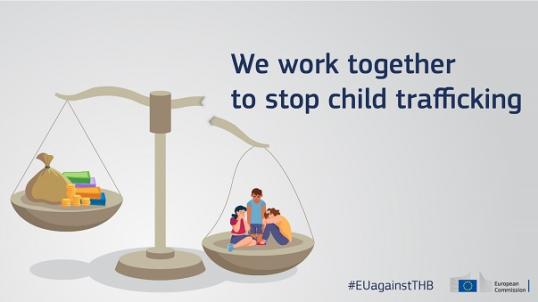Archived content
This website is no longer being updated. The content may be out-of-date and should be consulted for past reference only.
To find information about the College of Commissioners for the term 2024-2029, go to the Commission’s main website
This website is no longer being updated. The content may be out-of-date and should be consulted for past reference only.
Together Against Trafficking in Human Beings
Twitter Spaces Event
Monday October 18th is EU Anti-Trafficking Day. The main purpose of this day is to raise awareness on trafficking in human beings and increase the exchange of information, knowledge and best practices amongst the different actors working in this field.
Trafficking in human beings has no place in our society. Trafficking is a crime against people, against women and girls, boys and men. Trafficking is not simply about smuggling someone across a border. It’s about buying and selling actual people; exploiting their bodies, labour, innocence and, in the case of children, destroying their childhood.
And one of the worst aspects is the following: trafficking is a very profitable crime. If you traffic drugs or firearms you sell once but if you traffic people they are sold again and again. This is why it is such a terrible crime.
To mark this day, I am pleased to say that I will attend a Twitter Spaces event (Monday 18 Oct at 10:00 CEST) together with: Diane Schmitt (EU Anti-Trafficking Coordinator), Ilias Chatzis (Chief, Human Trafficking and Migrant Smuggling Sector, United Nations Office on Drugs and Crime), Ladislav Hamran (President of Eurojust) and Stana Buchowska (Regional Coordinator for Eastern Europe and Central Asia at ECPAT International).
The event will focus on trafficking of children and how to combat its different forms such as sexual exploitation, forced begging, forced labour, and criminal activities.
Children Trafficking
Trafficking endangers the most vulnerable and children are amongst them. Nearly one out of four victims in the EU are a child. And the vast majority of child victims are girls (78%). And of these many are EU citizens.
The majority of children are trafficked for sexual exploitation (64%). But children are also victims of labour exploitation. Criminals force children to beg or commit different crimes, such as the smuggling of illegal goods, drugs for example, and petty crimes. They are also at particular risk of falling victim to traffickers online. Last month in Sicily, police enforcement operations, carried out by Carabinieri, revealed worrying details of exploitation of children for the purpose of criminal activities. Ten-year-old children were involved in drug-dealing activities.
EU action against children trafficking
Thanks to the new EU Strategy on Combatting Trafficking in Human Beings that I presented last April, we have developed a comprehensive approach focusing on crime prevention, bringing traffickers to justice and protecting and empowering victims.
We need to make sure that traffickers, as well as those who use the services of victims, cannot benefit from diverse legislations across the EU Member States and that victims receive adequate protection within the EU regardless of where they are. I will look into the existing EU legislation to assess whether it is still fit for purpose and, based on this assessment, I will consider revising it, including regarding the possibility of having minimum EU rules that criminalise the use of exploited services of trafficking victims.
To protect children from the risk of trafficking we must implement systematic reporting and alerts on missing children for an early identification, referral procedures tailored to child victims, speedy appointment of guardians and effective free legal aid. We will also enable targeted funding to support specialised shelters for victims of trafficking, including specialised facilities for trafficked children.
Coordinated operational actions and cross border cooperation can also help cracking down human trafficking networks, bring perpetrators to justice as well as protect the victims. In July 2021, 92 minor victims were identified across Europe, in the context of an operation coordinated by Europol, Portugal, Spain and the United Kingdom, and supported by Frontex. Officers arrested 33 traffickers and identified 45 suspects of human trafficking. The operation targeted some of the most vulnerable victims: children who were potentially unaccompanied or had escaped from shelters, as well as children trafficked by family members who are part of large family clans in the context of intra-EU trafficking.
Internet service providers and technology companies are important actors for the identification and removal of online material associated with exploitation and abuse of trafficked victims. Prevention and awareness-raising activities on the safe use of the internet and social media, among others, could further contribute to mitigating the risk of child trafficking. I am working on comprehensive legislation to tackle child sexual abuse effectively, including by obliging providers to detect known child sexual abuse material. I want these companies to help us to better protect children, to take responsibility and to join us in stopping these horrible crimes that take place on their platforms. We owe it to children, to their right to privacy and dignity, to stop this wherever we can.
Trafficking in human beings destroys individuals’ lives by depriving people of their dignity, freedom and fundamental rights. That’s why we must do our best to end it.
For More information
Twitter Spaces Event - Together against trafficking in human beings
European Commission - Together Against Trafficking in Human Beings
Trafficking in human beings Web page
Joint Statement against Trafficking in Persons for World Day against Trafficking in Persons
EU Strategy on Combatting Trafficking in Human Beings 2021- 2025
EU Strategy on combatting Trafficking in Human Beings: Questions and Answers
Factsheet - Fighting Trafficking in Human Beings
Details
- Publication date
- 15 October 2021
- Author
- Directorate-General for Communication

